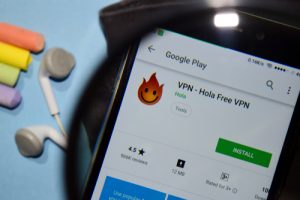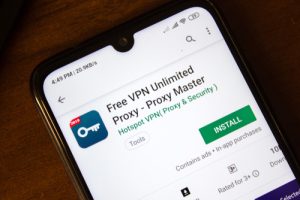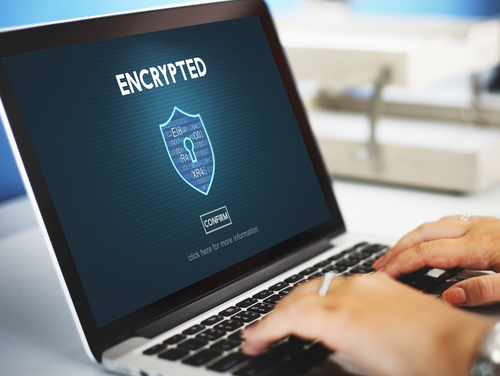Virtual Private Networks (VPNs) hide your IP address online. They can offer many benefits for internet users looking for privacy and security. However, there are a lot of VPN providers on the market, and VPNs can be a little pricey, at times, so it may be tempting to get a free VPN.
Not all free VPNs are alike. Many free VPNs do not protect your privacy like a premium VPN service does. Read on to learn about the pitfalls of choosing a free VPN and how you can get an affordable and secure VPN for your devices.

What is a Free VPN?
A free VPN is a virtual private network you don’t have to pay for. In theory, you just sign up with the free VPN provider, log in, and connect to the server. Then, you are supposed to get the benefits of a VPN network. VPN is a 44.6 billion dollar industry and it continues to grow each year.
Many people switch to VPNs for improved security when they use public WiFi at restaurants or hotels. Others use VPNs to bypass geo-restricted content or to get past network administrator blocks at work or in school. VPNs can also be used to mask their IP address while they use software to torrent or play peer-to-peer games.
VPNs are important in the workplace. VPNs can make it easier for a company to protect their activity online when they travel abroad. Then, they will be able to access content and web pages that they would normally use, but that may be banned in the country they are currently traveling through.
Whatever reason people choose to get a VPN, they are trusting that this private network is supposed to keep them safer than surfing the web on public Wi-Fi or through a regular internet service provider (ISP).
However, not all VPNs are alike. Some are legitimate and take privacy seriously, others do not. And free VPNs are even more of a wild card than paid ones.
What Risks Do Free VPNs Pose?
There are many risks involved when you choose a free VPN. In general, free VPNs are less secure and offer fewer of the features users are looking for in a VPN provider.
They Can Scam You
One of the first risks of using a free VPN is making sure you are not falling for a scam. Unfortunately, there are several fake websites that advertise free VPNs, but it will turn out to be a phishing attack.
The site will prompt you to enter sensitive information only to turn around and steal that information for financial gain. Another scenario that may occur is that instead of downloading the VPN, you may download malware, which will infect your computer.
Most of the malware was related to advertising. Free VPN providers make money through advertising and ads can contain malicious software such as worms, trojans, or viruses.
They Track You
Free VPNs are also more likely to track your data than paid subscriptions. The reason for this is that free VPNs need to make money somehow. And, unfortunately, there is a market for personal data. Most free VPN providers use embedded third-party trackers for analytics, tracking, and/ or advertising.
This is the very behavior that many VPN users are trying to avoid. According to Statistica, 7 out of 10 Americans use a VPN for personal and work use. Most people use a VPN to help protect their personal data. In fact, 46% of respondents to a survey by Statista were worried about companies tracking their online activities.
Some free VPNs also may take advantage of weak privacy laws. In countries where there are VPN bans, such as in China, free VPN companies may be collecting your data and reporting it to government entities.
These free VPNs also may redirect your browser without permission. They also are more likely to bombard you with pop-up ads. These ads are annoying and slow down your connection speed.
They Aren’t Good at Unblocking Content
VPN users also like the benefit of being able to unblock certain content, whether it’s on an organization’s network or a geo-restriction. Free VPNs are not as reliable about being able to unblock this content.
Many people want to use these VPNs to unblock Netflix content, but free VPNs just aren’t always up to task. Their shoddy infrastructure often means that they are easy for network admins to block or don’t have enough servers available in other countries to help you gain access to desirable streaming content.
They Slow Down Your Connection
Another downside to a free VPN is that they may offer a free service in order to lure you in. Then, they’ll slow down connection speeds, called throttling, to encourage you to subscribe to their “faster” paid services.
Also, the ads that help to make free VPN service possible also slow down that VPN’s service. They also don’t have the infrastructure to handle high volumes as effectively as more robust companies.
They Provide Poor Security
Companies that offer free VPNs often don’t have a lot of money to invest in security. So, they cut corners, which compromises your personal data. While developers are putting together the VPN app, they may leave out key components that provide you with safety while searching online.
Poorly constructed infrastructure creates vulnerabilities that cybercriminals can exploit to gather data and steal identities. Also, many free VPN service providers may have shady business owners who are operating the site with questionable tactics.

Which Free VPNs Are the Least Secure?
There are several free VPN providers on the internet, but some are more shady than others. It is always important to investigate any VPN service provider before committing to downloading and using a service.
You should always look for a VPN that has lots of good, comprehensive reviews by third parties and a track record of successful business.
Here is a list of some of the most insecure free VPNs on the market:
- Hotspot Shield: This is an infamous name in the VPN industry, that has recently been revealed as one of the worst VPNs. They track mobile users when they open the app. They also have a questionable privacy policy that includes collecting your IP address. Also, they admit to selling your personal information on the free versions. They don’t encrypt your traffic, leaving your data vulnerable to man-in-the-middle attacks.
- Betternet VPN: This free VPN service has high reviews, but it is a part of the same parent company that Hotspot Shield works with: Aura. So, Betternet VPN also collects your data, IP address, and sells that information.
- Touch VPN: Once again, this free VPN service has some good reviews, aside from the occasional complaints about technical flaws. But, they are also a part of Aura, which means Touch VPN tracks and sells your data. They also bother you with ads and in-app purchase requests.
- Hola VPN: This company is involved in a lawsuit in which one of the co-founders revealed that the other founder (his brother) was using the VPN service to plant malware on user’s devices. They would use a “trojan horse” to log, save, and process people’s data on its servers. Also, when you sign up for Hola VPN you agree to allow your IP address to be a drone computer in a botnet.
- Super VPN: This VPN is a hotspot for malicious web snoopers and hackers. In 2017, a study revealed that malware was in the installation files. In 2021, Super VPN was removed from Google Play due to a vulnerability that led to hackers accessing credit card information and other personal data. They don’t have a great track record.
- Psiphon VPN: This app is popular amongst Android users with high ratings, but it is a Triotut malware repackaged as a VPN. Attackers hid the malware in the app’s installation files. Triout malware conceals its existence on your device and quietly takes photos, records videos, collects GPS coordinates, logs inbound texts, and records calls.
Which Free VPNs Are the Most Secure?
Although many free VPNs are risky and riddled with issues, there are a few free VPNs that work the way they are supposed to. The best free VPNs on the market may still have limitations. You’ll get a more complete deal with a paid premium.
Here is a list of the best free VPNs:
- ProtonVPN: This VPN service provider has both a free and premium version. The free version does not limit the amount of data subscribers can use, as many others do. They only allow you one simultaneous connection. You have access to a selection of 3 servers in the following countries: the Netherlands, Japan, and the United States. They have a strong reputation and good privacy policies.
- TunnelBear VPN: It provides unlimited simultaneous connections, has annual independent audits, and an excellent privacy policy However, split tunneling is not available on all platforms. Also, there are data limits on the free version.
- PrivadoVPN: This VPN provider has a free plan that allows you 10GB of monthly data. The service has AES 256-bit encryption with access to 12 server locations. It supports OpenVPN and IKEv2 protocols. It also has a no-logs policy.
- Windscribe: This free plan has a 10GB monthly data limit and supports OpenVPN, IKEv2, and WireGuard protocols. They also provide access to servers in 10 countries.
How to Choose a Secure VPN
When choosing a VPN, it is important to weigh the pros and cons. There are several ways you can improve your search and better secure your connection. First, check out the VPN’s privacy policy. A reputable VPN will have information on how they store data.
Do they keep data logs? What do they do with your stored data? It is better to choose VPNs that use a no-logs policy. This means that they do not keep data logs and cannot track you. Tracking is another consideration to take into account.
Some VPN providers will track you. Many people switch to VPNs because they want to avoid being tracked by companies, so you must search the privacy policy and find third-party reviews to discover whether your VPN choice engages in tracking.
Another way to make sure you are choosing a reliable VPN provider is to check news sources. If the VPN company has been in the news for data breaches or lawsuits, it may not be the best choice.
A trustworthy VPN will have all of their privacy information out in the open. They will have several third-party reviews that explain both their pros and cons, and they will have a track record of service.
Sekur VPN Is a Secure Choice
At Sekur, we offer an affordable VPN that won’t compromise on privacy. Our VPN uses proprietary HeliX technology that transfers data in a 2048-bit encrypted tunnel. All your communications will happen on our secure, Swiss servers.
Sekur VPN will keep your IP address anonymous online while protecting your data with the latest encryption technology. Our servers are high-speed with unlimited data. You can use a single license for all of your associated devices. Our technology is not open source, so you can feel more secure from hackers as you navigate securely on our Swiss servers.
Our VPN is easy to set up and use. It leaves no trace of the data you are transferring.
In addition to our VPN services, we also provide secure email and instant messaging. Choose Sekur to regain your privacy.
Conclusion
Although it may be appealing to look for a free VPN service, these VPNs do not all meet the standards that many premium services can provide. Free VPNs are often less secure and more risky. So, it is important to shop around to find the best VPN for the most affordable price.
Several low-cost VPN options will protect your privacy and data better than a free VPN. When you choose a VPN, whether it is free or a subscription, be sure to read the privacy policy to find out how the provider handles data logs.

